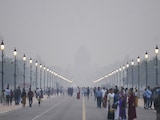New Zealand's largest metropolitan city, Auckland, was recently named the world's "spongiest" city, according to a ranking by multinational architecture and design firm Arup. Citing the report, World Economic Forum (WEF) said that the city is best at absorbing excess rainfall, thanks to its geography, soil type and urban design.
The organisation explained that "sponge cities" work with nature to soak up floodwater rather than diverting it with concrete infrastructure. This means, the spongier the city, the more resilient it is to flooding.
In its report, Arup examined the amount of green space and permeable local soil in seven major global cities, including London, New York, Singapore, Auckland, Mumbai, Nairobi and Shanghai. The study covered approximately 150 square kilometres of each city's main urban centre and found that New Zealand's largest metropolis came out on top, while London was ranked as the least spongy city.
Also Read | Rajasthan Resorts Among Top 40 Global Desert Destinations In New Book
As per the BBC, in their study, the researchers calculated that 50% of Auckland's surface was green or blue, even after excluding its harbours. In an intense rainfall event, they estimated that 35% of the water falling on Auckland would be absorbed into these spongy blue and green parts, leaving 65% that would have to be dealt with by engineered stormwater systems - or else overflow and flood.
"Given the challenges of climate adaptation, cities can't go on being concrete jungles, in conflict with nature," said Arup's Global Water Leader, Mark Fletcher, as per the BBC.
"Every city has unique natural assets - grasslands, forests, parklets, lakes and ponds - [and] these need to be quantified, valued and utilised in the same way we treat other vital resources," Mr Fletcher added.
Separately, WEF noted that climate change is predicted to increase rainfall intensity in Auckland, and January 2023 was Auckland's wettest-ever month. Experts said that despite Auckland's world-leading sponginess, more still needs to be done to protect the city against major storms.















